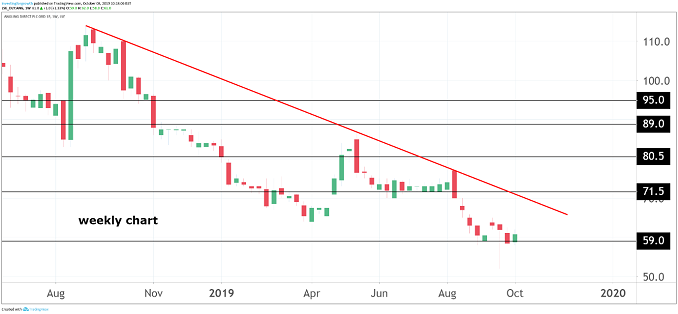Stockwatch: This small-cap could be a real catch
This company's business strategy stands a fair chance of success, believes our companies analyst.
8th October 2019 11:08
by Edmond Jackson from interactive investor
This company's business strategy stands a fair chance of success, believes our companies analyst, and it should still be capable of advancing its operations in a Brexit recession.

Should you simply avoid retail stocks altogether in these uncertain times, or does current weak sentiment offer an opportunity to accumulate, especially where new concepts are involved?
AIM-listed Angling Direct (LSE:ANG) has the semblance of both a marketing and stock market concept able to deliver useful returns: rationalising a fragmented industry of fishing tackle shops and adding online capability.
Acquisitions' integration has long proved a rationale for developing a listed plc, and fishing tends to have a cult-like following among those hooked. There's dispute as to whether it's cruel, although it is hard to envisage opposition mounting like for field-sports. There's also a perception that it is just for white middle-aged men in demographic decline.
Rod sales are definitely falling – and due soon for the latest season – and Anglers Mail said on 26 October last year that they had declined by 39.4% since 2011, with a continued trend down 14.7% for the 2017/18 season. While I recall my fascination was aged 8 to 11, nowadays there are fewer young people coming through. Last weekend I came across a Scouts' long-distance hiking event with the organisers saying numbers are in decline: "they all seem to be on their mobile phones nowadays".
On a positive view, recreational fishing involves nearly £1.5 billion overall spending, and you could say its decline is actually a spur for rationalising its retail side. Even so, Fishing Republic – the other AIM-listed tackle supplier – ended up in financial difficulties a year ago, its shares suspended after posting a £2.5 million loss that September, versus a £117,544 loss previously.
After floating in 2015, that business met with very difficult trading in 2017, and there was a sense of insufficient room for two big retailers in a difficult market where Amazon (NASDAQ:AMZN) and eBay are poaching sales. Last December, Fishing Republic ended up in administration, although for August to November 2018 Angling Direct reported group sales up 31.5%, Black Friday sales up 42.5% and international sales nearly doubling "which reflects our strong retail offering and brand loyalty."
It's a somewhat edgy investment rationale then, and unclear exactly what happened to the Fishing Republic shops (whether closed, hence capacity removed). Angling Direct's prelims last May did not cite acquiring any from the administrators; just that the UK fishing tackle market remains large and fragmented with over 1,800 operators (mainly owner-managed) plus a large continental European market to tap.

Source: TradingView Past performance is not a guide to future performance
Latest interim results show good sales' progress
Like-for-like sales' growth to end-July advanced from 4.2% to 14.9% or by 41.9% including acquisitions, with like-for-like footfall up 9.8%. There's a dichotomy on profits however, with management proclaiming EBITDA up 15.7% to £1.25 million and net cash generated from operations (yes encouragingly) up from £0.6 million to £1.7 million. Yet this rests on adding back the depreciation charge that’s risen (see note 1 to the accounts) from £465,000 to £775,000.
In terms of reported profit on the income statement, variability in costs - as a percentage of turnover - has cut operating profit by 23% to £472,000, while distribution costs fell in ratio terms, administrative costs and cost of sales rose. Finance costs claimed 32% of operating profit, leaving pre-tax profit 33% lower at £323,000.
As yet, that's little by way of substance, also versus a £38 million capitalisation if the narrative ever has to caution, implying patience is required for the business model to evolve and mature from 30 stores currently.
Since databases use reported profit, the table only shows a low single-digit operating margin tipping negatively, although I calculate that before depreciation it's 4.7% - still not a lot, say if a hard Brexit means sterling trends lower still, affecting imports of tackle, although weak sterling could boost export prospects.
Similarly, as when I wrote on Angling Direct last February, I'm dismayed that with Brexit potentially now so close there is no indication whatsoever of the risk scenarios this management recognises and is prepared for.
"We successfully launched our German, French and Dutch websites last year, which are building on revenue growth of 48%, 52% and 59% respectively" yet there's no mention of tariffs-risk in the event of a no-deal Brexit. Typically, plc's talk of having established continental European subsidiaries, but quite whether that is a guaranteed way around tariffs on behalf of a parent firm is unclear, although for digital trade the issue seems nebulous.
Management says its second half started well with August sales up 33% like-for-like, and the group on track to meet market expectations for the full year to end-January 2020, which so far as I can see are for a modest £0.3 million net loss and earnings per share (EPS) of -0.5p, then a return to modest profit of £0.4 million and EPS of 0.6p. That's a whopping price/earnings (PE) - 100x - albeit very small scale in context, so can rapidly change if the business model proves itself.
| Angling Direct - financial summary | |||||
|---|---|---|---|---|---|
| year ended 31 Jan | 2015 | 2016 | 2017 | 2018 | 2019 |
| Turnover (£ million) | 11.1 | 16.4 | 21.0 | 30.2 | 42.0 |
| IFRS3 pre-tax profit (£m) | 0.53 | 0.43 | 0.66 | 0.16 | -0.27 |
| Normalised pre-tax profit (£m) | 0.55 | 0.46 | 0.68 | 0.89 | 1.6 |
| Operating margin (%) | 4.9 | 2.9 | 3.5 | 0.7 | -0.6 |
| IFRS3 earnings/share (p) | 1.0 | 0.85 | 1.31 | 0.10 | -0.55 |
| Normalised earnings/share (p) | 1.05 | 0.91 | 1.36 | 1.76 | -0.30 |
| Earnings per share growth (%) | -13.3 | 49.5 | 29.4 | -117 | |
| Cash flow/share (p) | -0.21 | 0.39 | -0.38 | -1.49 | -7.26 |
| Capital expenditure/share (p) | 0.37 | 0.91 | 0.50 | 4.47 | 4.73 |
| Free cashflow/share (p) | -0.58 | -0.52 | -0.88 | -5.96 | -12.0 |
| Net asset value/share (p) | 0.29 | 1.09 | 2.34 | 19.2 | 42.1 |
| Source: historic Company REFS and company accounts |
Net asset value ought to limit downside risk
Without any chance of dividends for the foreseeable future a chief question is what prop there is for the shares if Angling Direct succumbs to a Brexit-led consumer slowdown. Due to a £20 million share placing at 92.5p last October, there was £13.3 million left at end-July, likely a tad lower after a Leeds store was opened in August and in Milton Keynes during September – both popular fishing areas.
That meant net asset value per share of 41.9p or 34.3p excluding £4.9 million intangible assets. Yes, the £13 million cash will run down for acquisitions, but pricing would favour the buy-side if there’s an economic slowdown. So, while I'm wary lest the rosy narrative is tinged in due course, Angling Direct should still be capable of advancing its operations in a Brexit recession.
Possibly in respect of all this, the stock has edged up 2p to 60p after the results, on steady small-scale buying, having slid from about 110p a year ago. The stock floated at 64p in July 2017 and tested 120p six months later before being hit by the wider fourth-quarter 2018 stock market slide, then led into 2019 by gloom towards retailers generally.
Yet "Holdings" data issued by the regulatory news service (RNS) shows BlackRock investment managers accumulating Angling Direct this year, raising their stake from 10.1% in February to 14.3% last August. While a peanut holding for one of the world's largest asset managers, it implies they believe in a long-term prize, otherwise they are locked in if company profits don't ramp up.
I've previously examined the company/stock twice: at 104p in August 2018, rating its stock as "Avoid" on price, given the risk a disorderly Brexit could well result in EU tariffs and lower UK consumer spending. Last February, at 73p, I remained steeled for political risk while liking the industry rationalisation model, hence "Buy on weakness", which is why it is now timely to review.
A case for testing the market, averaging in
Lack of profits substance and uncertainty as to UK discretionary spending means this share remains speculative not investment grade. Yet the model to rationalise UK shops and grow sales online, especially abroad, stands a fair chance of success – the long-term risk being that Angling Direct then succumbs to fishing's decline once it’s achieved optimal size.
For investors who don't want to worry about staying attuned, "Avoid". But, on a risk-engaging view, you might take an initial stake as a test and then see if the market and RNS news affirms this, with scope to add or cut along the way. There ought to be a useful smaller plc to construct here, taking a three-to-five-year view. As a smaller speculation: Buy.
Edmond Jackson is a freelance contributor and not a direct employee of interactive investor.
These articles are provided for information purposes only. Occasionally, an opinion about whether to buy or sell a specific investment may be provided by third parties. The content is not intended to be a personal recommendation to buy or sell any financial instrument or product, or to adopt any investment strategy as it is not provided based on an assessment of your investing knowledge and experience, your financial situation or your investment objectives. The value of your investments, and the income derived from them, may go down as well as up. You may not get back all the money that you invest. The investments referred to in this article may not be suitable for all investors, and if in doubt, an investor should seek advice from a qualified investment adviser.
Full performance can be found on the company or index summary page on the interactive investor website. Simply click on the company's or index name highlighted in the article.
Disclosure
We use a combination of fundamental and technical analysis in forming our view as to the valuation and prospects of an investment. Where relevant we have set out those particular matters we think are important in the above article, but further detail can be found here.
Please note that our article on this investment should not be considered to be a regular publication.
Details of all recommendations issued by ii during the previous 12-month period can be found here.
ii adheres to a strict code of conduct. Contributors may hold shares or have other interests in companies included in these portfolios, which could create a conflict of interests. Contributors intending to write about any financial instruments in which they have an interest are required to disclose such interest to ii and in the article itself. ii will at all times consider whether such interest impairs the objectivity of the recommendation.
In addition, individuals involved in the production of investment articles are subject to a personal account dealing restriction, which prevents them from placing a transaction in the specified instrument(s) for a period before and for five working days after such publication. This is to avoid personal interests conflicting with the interests of the recipients of those investment articles.